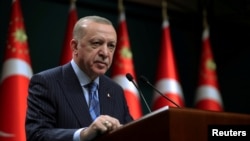Turkish President Recep Tayyip Erdogan has signed up to Russian President Vladimir Putin's plan to turn Turkey into a Russian natural gas hub.
Erdogan, addressing his parliamentary deputies Wednesday, said Turkey had secured a vital opportunity by agreeing to Putin's plan.
“European countries are currently searching to find where to get natural gas supplies," he said. "Thank God Turkey does not have such a problem. Hopefully, we will soon become a hub for natural gas.”
Last week, Putin said the gas would be redirected through Turkey from the Nord Stream pipelines under the Baltic Sea, which were damaged by blasts last month.
Russia already supplies Turkey's TurkStream pipeline gas under the Black Sea. But the Kremlin admitted the pipeline has limited extra capacity. By the time new capacity has been created, said international relations professor Senem Aydin-Duzgit of Istanbul's Sabanci University, Europe will likely have secured alternative supplies.
“I mean, who's going to buy that energy?" he said, "I mean, realistically speaking, if the Europeans refuse to buy that gas, who's going to buy it? So who will Turkey be a center for? Right? Who will be the destination of that gas? That's what I'm just not convinced about.”
Putin's hub proposal comes as Ankara is seeking to position itself as an alternative to Russian energy for Europe, as Turkish presidential spokesman Ibrahim Kalin underlined Wednesday.
Kalin said, "The offer by Putin is very important. But if Europe is looking for alternatives from Russian gas, there are two places it can find it: through a pipeline from Azerbaijan running through Turkey, and possible Iranian gas in the future, again, using Turkish pipelines."
Putin appeared to take Ankara by surprise with his gas hub plan. The proposal came as Turkey has faced growing scrutiny from its Western allies over its refusal to enforce sanctions against Russia. Washington and the European Union have warned that Turkey could face secondary sanctions if it violated its measures against Russia.
Ankara denies any wrongdoing, but Putin's gas proposals come as the West's patience may be running out, warned Maria Shangina, a specialist on international sanctions at the International Institute for Strategic Studies.
“The more Turkey explodes this space between legal and illegal activities with Russia, I think there might be a snapping point from the West to impose sanctions,” she said.
But some analysts point out that Erdogan will try to accommodate Putin, given that he is trying to negotiate a cut in the price of Russian gas and a deferral of payments until after next year's Turkish presidential elections. Erdogan is seeking to cut near triple-digit inflation, as most opinion polls indicate his electoral defeat.




